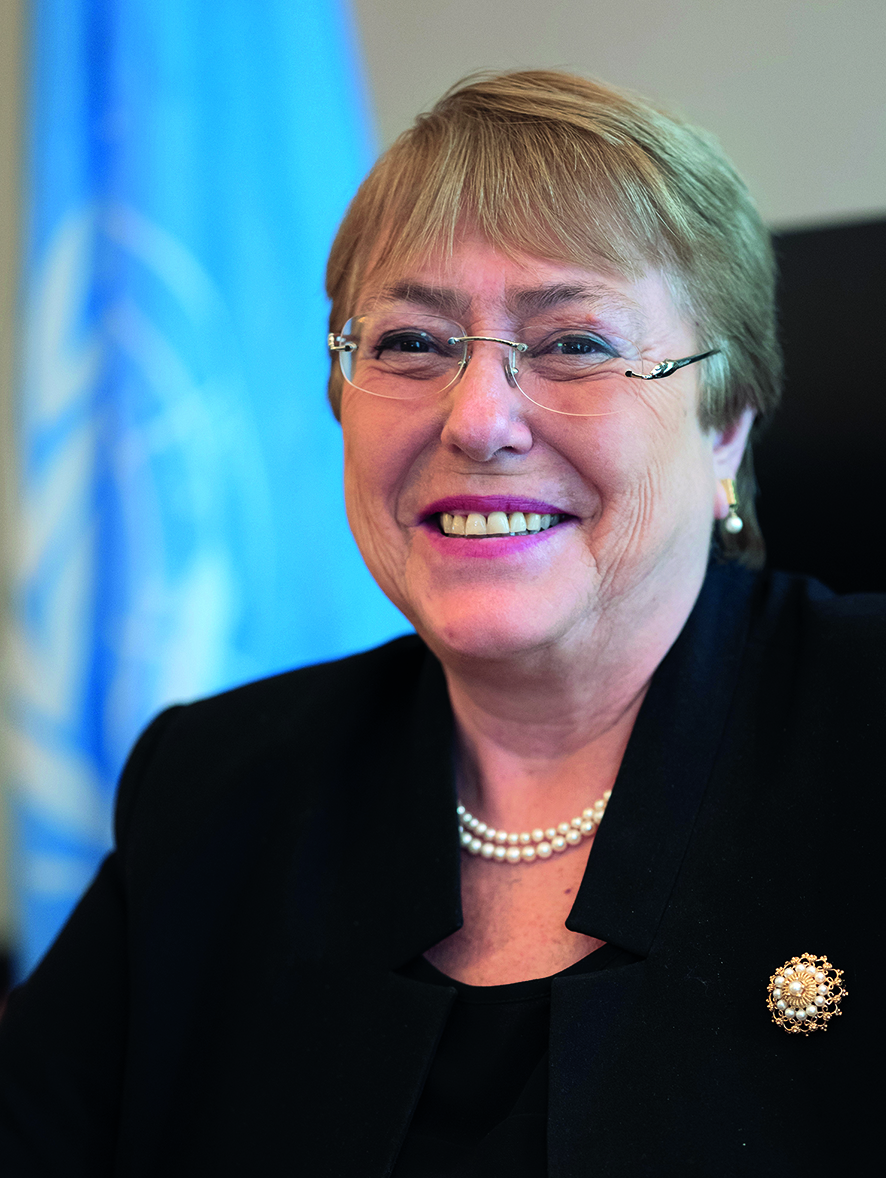As we at the UN Human Rights Office stepped up our monitoring and developed new strategies, working methods and data-based analytic tools to anchor human rights in responses to the pandemic, it became obvious that our significant experience in combating discrimination and inequalities makes us highly qualified to help societies to not only recover from the immediate medical and socio-economic wounds – but also to repair key underlying weaknesses.
I am proud of the speed and efficacy with which we shifted to pandemic operations so that we could continue implementing almost all of our planned work – even in the face of budget restrictions – while also addressing the many new challenges posed by the global pandemic with respect to human rights. This Annual Report outlines a wide variety of examples.
I trust that we can continue to count on your support as we look to the future.
Thank you for standing up for human rights.

United Nations
Human Rights Report 2020
The UN Human Rights Report 2020 presents the progress achieved in 2020 against the targets set out in the OHCHR Management Plan 2018-2021. It also shows how we addressed the many challenges highlighted and reinforced by the COVID-19 pandemic with respect to human rights. It includes an overview of management, funding, income and expenditure, with detailed results from the field and at headquarters.
Download Full Report

Michelle Bachelet
High Commissioner for Human Rights
High Commissioner for Human Rights
Foreword
“2020 was a harrowing year for people around the world. The COVID-19 pandemic raced across pre-existing fault lines in every society, exploiting and enlarging human rights gaps.”
Read full Foreword
Chapters
Stories
Go to Exposure for more stories
Children’s rights in the Pacific: An historic treaty body session in Samoa
A cornerstone in due diligence policies: The voice of human rights defenders
Calling for people-centred policies in Serbia, with a focus on ESCRs
One step forward in Sudan
#StandUp4Migrants: Changing the narrative on migration
Advancing the rights of LGBTI persons in Bolivia: The civil union of David
and Guido
and Guido
Court ruling in Kenya: A milestone in environmental justice
Empowering young people to participate in the promotion of their rights
Supporting Syrian civil society actors in their struggle to claim and defend their rights
UN Human Rights around the world
Country / Stand-alone Offices / Human Rights Missions
Headquarters
Regional Offices / Centres
Human rights
components of UN Peace / Political Missions
components of UN Peace / Political Missions
Human Rights Advisers deployed under the framework of the UNSDG
Other types of field presences
Mexico
Guatemala
Honduras
El Salvador
Costa Rica
Belize
Dominican Republic
Jamaica
Venezuela
Haiti (BINUH)
South America
(Santiago de Chile) Central America
(Panama City) Columbia Bolivia
Bolivia Argentina Uruguay Brazil Paraguay Peru Ecuador Barbados Trinidad and Tobago Guyana Bosnia
Herzegovina Montenegro Serbia Europe (Brussels) Geneva Belarus Ukraine Republic of Moldova South-East Asia
(Bangkok)
Myanmar –
based in Bangkok
Myanmar (based in Cox's Bazar) Bangladesh Nepal Sri Lanka Maldives Malaysia Cambodia Pacific (Suva) Timor-Leste Papua New Guinea Philippines OHCHR Field-based structure
(Seoul, Republic of Korea) Mongolia Afghanistan (UNAMA) Central Asia
(Bishkek) Kosovo
(UNMIK) Russian Federation Republic of North Macedonia South Caucasus
(Tbilisi) Republic of
North Macedonia Middle East and
North Africa (Beirut) Jordan Saudi Arabia Yemen UN Human
Rights Training and
Documentation Centre
for South-West Asia
and the Arab Region
(Doha) Iraq (UNAMI) Lybia (UNSMIL) Burundi
Rwanda Uganda South Sudan
(UNMISS) Mozambique Southern
Africa
(Pretoria) Lesotho Zimbabwe Malawi Madagascar Kenya Somalia (UNSOM) East Africa (Addis Ababa) UN Sub-Regional
Center for Human
Rights and
Democracy in
Central Asia
(Youndé) Central
Africa
Republic
(MINUSCA) Democratic
Republic
of the Congo
(MONUSCO) Nigeria Liberia Guinea Burkina Faso
G5 Sahel Niger
Niger
G5 Sahel Mali
(MINUSMA)
G5 Sahel Guinea-Bissau (UNIOGBIS) West Africa (Dakar) Sudan
(UNAMID/UNITAMS)
Chad
G5 Sahel
Mauritania
G5 Sahel
Tunisia Syria - based in Beirut State of
Palestine
(Gaza and
Ramallah) New York
(Santiago de Chile) Central America
(Panama City) Columbia Bolivia
Bolivia Argentina Uruguay Brazil Paraguay Peru Ecuador Barbados Trinidad and Tobago Guyana Bosnia
Herzegovina Montenegro Serbia Europe (Brussels) Geneva Belarus Ukraine Republic of Moldova South-East Asia
(Bangkok)
Myanmar –
based in Bangkok
Myanmar (based in Cox's Bazar) Bangladesh Nepal Sri Lanka Maldives Malaysia Cambodia Pacific (Suva) Timor-Leste Papua New Guinea Philippines OHCHR Field-based structure
(Seoul, Republic of Korea) Mongolia Afghanistan (UNAMA) Central Asia
(Bishkek) Kosovo
(UNMIK) Russian Federation Republic of North Macedonia South Caucasus
(Tbilisi) Republic of
North Macedonia Middle East and
North Africa (Beirut) Jordan Saudi Arabia Yemen UN Human
Rights Training and
Documentation Centre
for South-West Asia
and the Arab Region
(Doha) Iraq (UNAMI) Lybia (UNSMIL) Burundi
Rwanda Uganda South Sudan
(UNMISS) Mozambique Southern
Africa
(Pretoria) Lesotho Zimbabwe Malawi Madagascar Kenya Somalia (UNSOM) East Africa (Addis Ababa) UN Sub-Regional
Center for Human
Rights and
Democracy in
Central Asia
(Youndé) Central
Africa
Republic
(MINUSCA) Democratic
Republic
of the Congo
(MONUSCO) Nigeria Liberia Guinea Burkina Faso
G5 Sahel Niger
Niger
G5 Sahel Mali
(MINUSMA)
G5 Sahel Guinea-Bissau (UNIOGBIS) West Africa (Dakar) Sudan
(UNAMID/UNITAMS)
Chad
G5 Sahel
Mauritania
G5 Sahel
Tunisia Syria - based in Beirut State of
Palestine
(Gaza and
Ramallah) New York
